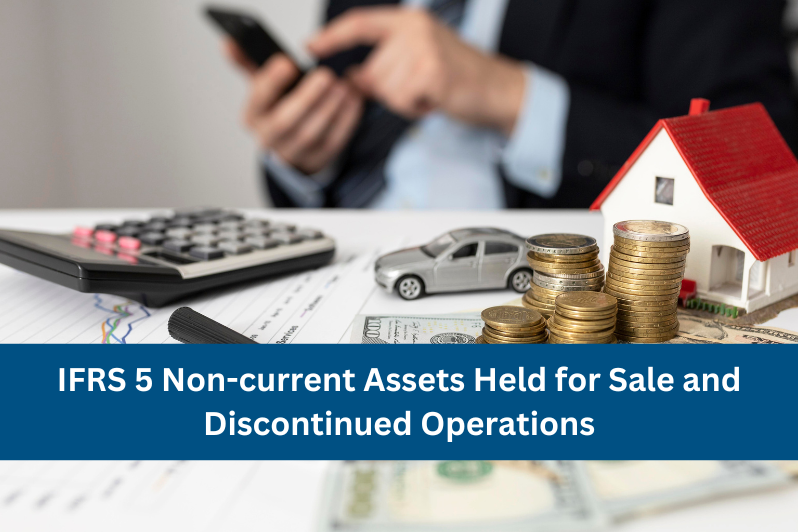This article seeks to provide a comprehensive understanding of the key considerations for non-current assets held for sale and discontinued operations. It is essential for businesses to ensure compliance with IFRS 5 standards in compliance with the statutory regulations. Thus, corporations are advised to seek the services of trusted Audit Firms in Dubai that offer tailored solutions upon implementing IFRS 5 standards and to ensure compliance.
What are the Objectives of IFRS 5?
IFRS 5 involves 2 main aspects that request attention;
- Accurate accounting treatment for assets held for sale or disposal groups.
- Comprehensive presentation and disclosure requirements for discontinued operations.
It is important to note that IFRS 5 relates to all non-current assets and leaves no room for exclusions. While there are detailed measurement exceptions outlined within the standard, the requirement remains to present and disclose information about these assets in alliance with IFRS 5.
What are the Essential Concepts you Need to know?
To direct IFRS 5 effectively, you have to know about the following 2 essential concepts;
1. Non-Current Assets Held for Sale
It emphasizes assets that are categorized as held for sale. IFRS 5 offers explicit standards for determining when an asset should be categorized as held for sale such as;
- Determined to sell
- Convenience for immediate sale
- Probability of completion within a specified timeframe
Understanding the accounting behavior and disclosure requirements for non-current assets held for sale is fundamental for correct financial reporting.
2. Discontinued Operations
IFRS 5 reports the demonstration and disclosure requirements for discontinued operations. Discontinued operations state mechanisms of a body that have been disposed of or are categorized as held for sale. It represents a distinct major line of business or geographical area of operation. The standard frameworks specific standards for categorizing operations as discontinued and delivers direction on reporting their financial results distinctly.
When to Categorize an Asset as Held for Sale?
Companies should categorize a non-current asset as held for sale if it is carrying expense and will be recovered primarily through a sale rather than continuing use.
Disposal group is a new perception introduced by IFRS 5. It signifies a group of assets and obligations to be disposed of together as a group in a distinct transaction.
For instance, when a business runs a small number of divisions and chooses to sell one division, then all assets (with PPE, catalogs, delayed tax, etc.) and all liabilities of that division would signify a disposal group.
When will an Asset be Realized through a Sale?
The asset must be accessible for immediate sale in its present settings and the sale must be highly credible.
IFRS 5 sets some standards for the sale to be credible, these are;
- Controlling must be dedicated to a plan to sell the asset.
- An active platform to find a buyer must have been started.
- The asset must be actively advertised for sale at a price rational to its existing fair value.
- The sale is likely to be finished within 1 year from the date of organization.
- Important changes to the plan are improbable.
Similar standards also apply to assets held for circulation to owners.
How to Account for Assets Held for Sale?
Once you classify an asset as held for sale, then you have to measure it under IFRS 5. Though, IFRS 5 lists some measurement exceptions that are;
- Deferred tax assets (IAS 12 Income Taxes).
- Assets arising from employee benefits (IAS 19 Employee Benefits).
- Financial assets within the range of IFRS 9 Financial Instruments.
- Non-current assets that are accounted for are in line with the fair value model in IAS 40 Investment Property.
- Non-current assets that are restrained at fair value have fewer costs to sell in line with IAS 41 Agriculture.
- Prescribed or cultural rights under insurance agreements as distinct in IFRS 4 Insurance Contracts.
When you categorize any of the above sorts of assets as assets held for sale, you stay measuring them under the same accounting guidelines as before sorting (for instance, financial instruments held for sale will be measured under IFRS 9, not IFRS 5).
Choose Audit Firms in Dubai
Understanding the main considerations of IFRS 5 is important for companies dealing with non-current assets held for sale and discontinued operations. Complying with the accounting treatment, the demonstration outlined in IFRS 5 confirms transparent and compliant financial reporting. Therefore, companies are advised to seek the services of trusted Audit Firms in Dubai who offer tailored solutions upon implementing IFRS 5 standards in compliance with statutory regulations. Thus, contact us today and we shall be glad to assist you.
Read More: Auditing Firms In Dubai Overview Of IFRS 9
Kasun Liyanage is an Audit Manager with over 7 years of experience dealing with diversified corporate clients. He not only manages the team’s work schedule but also is an expert in handling audit areas such as external audits and fraud investigation, Internal control benchmarking and best practices and well as preparation of financial statements and IFRS compliance.
